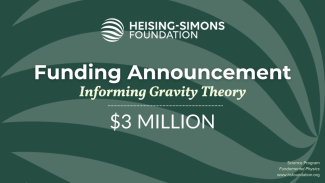Adam Kaufman
Boyd
Jamie joined the group after completing undergraduate degrees in Physics and French at the University of Oklahoma. As an undergrad, she explored several areas of research, from particle physics to accelerator design to plasma physics, before discovering atomic physics, which captured her interest. Her love for atomic physics grew while working in the group of Prof. Grant Biedermann at OU building a cesium optical tweezer experiment. After graduation, she interned for a year at the Institut d’Optique in Paris in the group of Prof.
Wang
Kaizhao rejoined the group as a graduate student after he finished his master's degree in Quantum Engineering at ETH Zurich and bachelor's degree at Tsinghua University in Beijing. His interest in quantum information processing started when he was a visiting student at Oxford during his bachelor's degree. After returning to Beijing, he joined the group of Prof.






 The Physics Frontiers Centers (PFC) program supports university-based centers and institutes where the collective efforts of a larger group of individuals can enable transformational advances in the most promising research areas. The program is designed to foster major breakthroughs at the intellectual frontiers of physics by providing needed resources such as combinations of talents, skills, disciplines, and/or specialized infrastructure, not usually available to individual investigators or small groups, in an environment in which the collective efforts of the larger group can be shown to be seminal to promoting significant progress in the science and the education of students. PFCs also include creative, substantive activities aimed at enhancing education, broadening participation of traditionally underrepresented groups, and outreach to the scientific community and general public.
The Physics Frontiers Centers (PFC) program supports university-based centers and institutes where the collective efforts of a larger group of individuals can enable transformational advances in the most promising research areas. The program is designed to foster major breakthroughs at the intellectual frontiers of physics by providing needed resources such as combinations of talents, skills, disciplines, and/or specialized infrastructure, not usually available to individual investigators or small groups, in an environment in which the collective efforts of the larger group can be shown to be seminal to promoting significant progress in the science and the education of students. PFCs also include creative, substantive activities aimed at enhancing education, broadening participation of traditionally underrepresented groups, and outreach to the scientific community and general public.